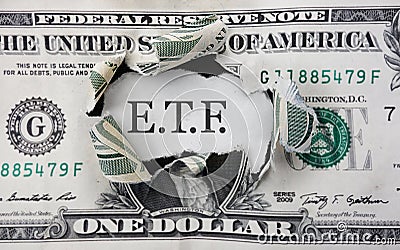ETFs (exchange traded funds) are currently one of the most popular instruments among investors of all kind. Most ETFs are built in a way to follow a certain index as closely as possible. That's why ETFs are often referred as passively-managed funds. Traditional funds that the local bank has tried to sell you thousands of times are actively-managed funds, which don't follow the index, but try to beat it. However, history shows that actively-managed funds have mostly failed to beat the index, due to which many investors have started to prefer passively-managed funds.
ETFs offer great diversification in terms of industries, geography and assets.Through ETFs you can invest in equity, track an index, invest in debt, invest in various industries and sectors (including the US Aerospace & Defence ETF, for instance) and of course invest in certain commodities such as oil, copper and gold. ETFs offer also significantly lower management fees than actively managed funds. Typical annual management fee of an actively-managed fund is around 1-2 %, when typical annual management fees of a passively-managed ETF is lower than 1 %. It is clear why especially small investments tend to gather nowadays from traditional funds to ETFs.
ETFs have become so popular, that financial institutions such as Nordea and Nordnet offer their trading without any commissions. Especially this increases the popularity of ETFs even more among small investments. More and more money is pouring into the ETFs, which in terms means less money in the primary market. When investors start trading more in the secondary market with ETFs than with the assets that the ETFs are based on, we will face a huge risk in liquidity. And I mean huge.
Heisenberg Report described a good example of the situation. I recommend to check out this site, it's pretty hilarious. Imagine you have played the piano well for a couple of years. Because you're busy with your new job, you don't have the time to play the piano as much as before. Then after time goes by, you try to impress your friends by playing the piano after a night out. Because you are intoxicated, you play very badly, people laugh at you and you end up vomiting into an expensive Hermés-bag. You are the ETF, your piano-skills are the primary market and vomiting into the bag is a fire sale.
Consider this. If one wants to sell 1,000,000$ worth of iShares Core MSCI World UCITS ETF and another one is willing to buy the same ETF with 1,000,000$, the trade can be executed without touch to the actual stock market. This imposes a decrease in liquidity in the primary market.
What if there would be a financial crisis? In some kind of a financial crisis a significant amount of investors would probably be selling most of their ETFs at the same time in panic. For these purposes the issuer of the ETF has ordered measures in providing liquidity to the primary market of its ETF. In practice this means buying or selling the underlying assets of the ETF to make the market liquid and to make the trades possible for the investors selling or buying the ETF. If there's no liquidity in the primary market, the issuer can't sell the asset because no-one's there buying it! The issuer has to make a fire sale and sign the cost of the transaction into its balance sheet.
However, because of the Volcker rule and Basel III-directives which were introduced after the 2008 financial crisis, this kind of fire sale is some what restricted and there is a possibility that the issuer can't just sell the underlying asset in any means. When more and more people are selling the ETF, the value of the ETF crashes because the liquidity of the underlying asset cannot meet the liquidity and the excess supply and decreasing demand of the ETF.
This introduces yet again risk for the financial markets. Even the issuers of the ETFs have stated that the ETF cannot be more liquid than the underlying market. Thus, the decreased liquidity of the primary market due to the growing amounts of ETF-investments, reflects to the liquidity of the ETFs themselves. This is rather disturbing.
Statistics show that passive investments are already practically in parity with the active investments and ETFs are way more popular nowadays than active funds. A good example comes from the high-yield bond-market, which according to research is steadily falling on the critical level in its liquidity. What makes the situation even worse is the growing popularity of high-yeld bond ETFs during the past years.
I would say so far so good, the piano is still playing its tune and investors are currently enjoying the rides offered by the indexes and stock-markets all over the world. I'm not saying that ETF is the new CDO, but ETF's impose some "hiding potential" to create disturbance in the financial markets in the future. At least I'm questioning my current ETF-investments little by little.
Text: SW
Picture's don't belong to me



